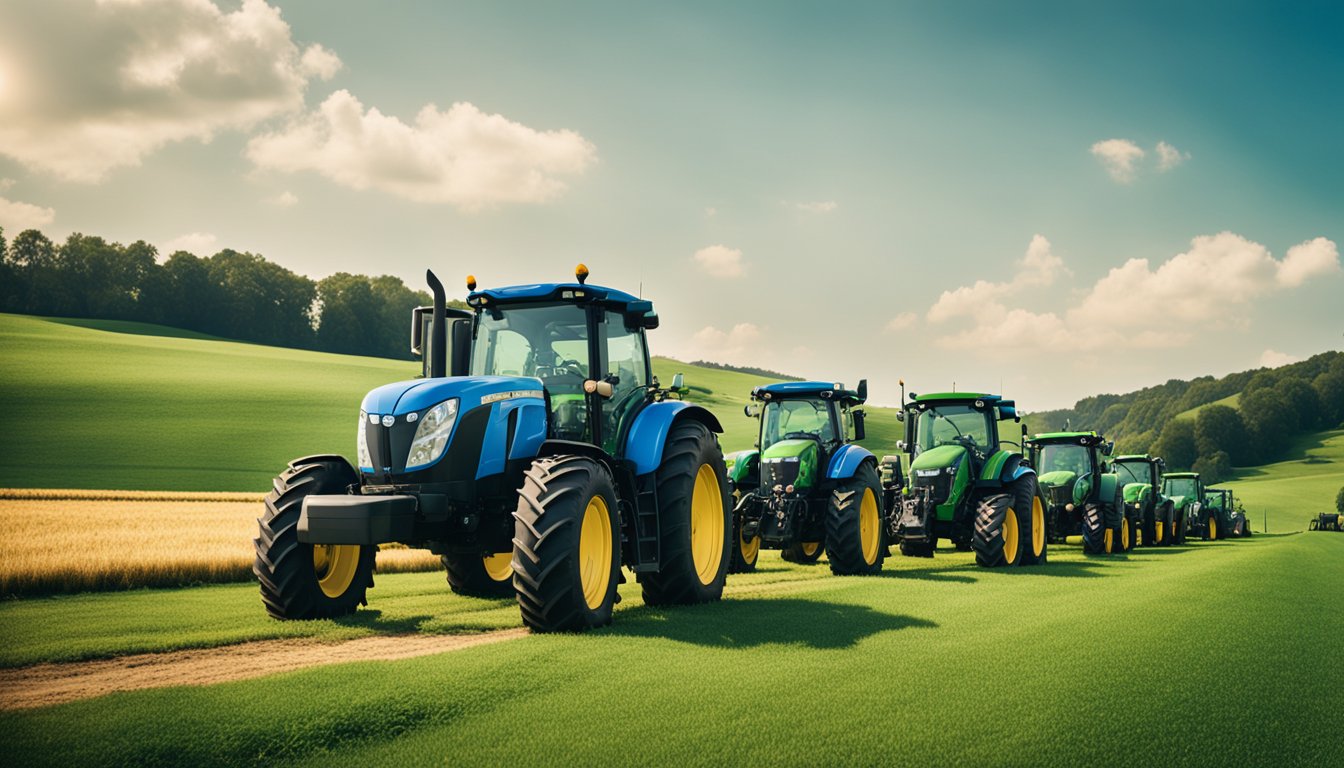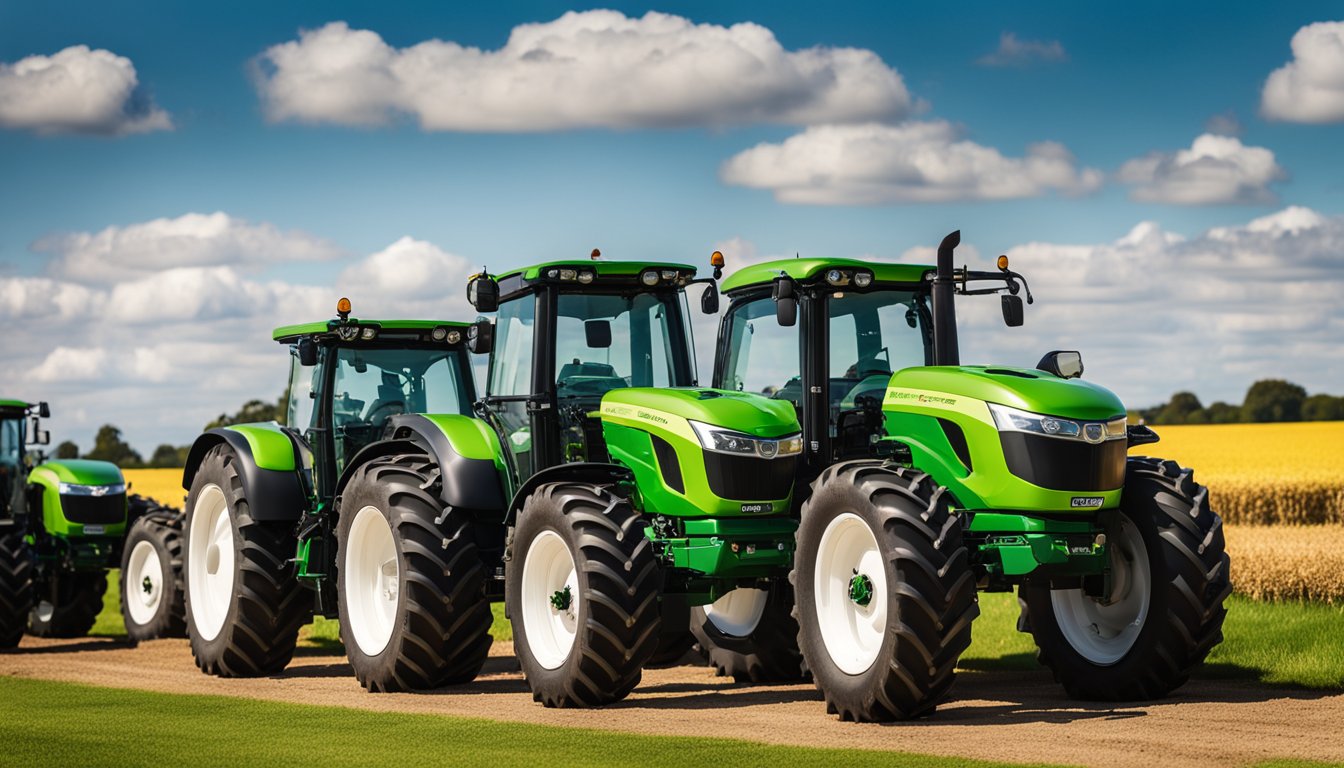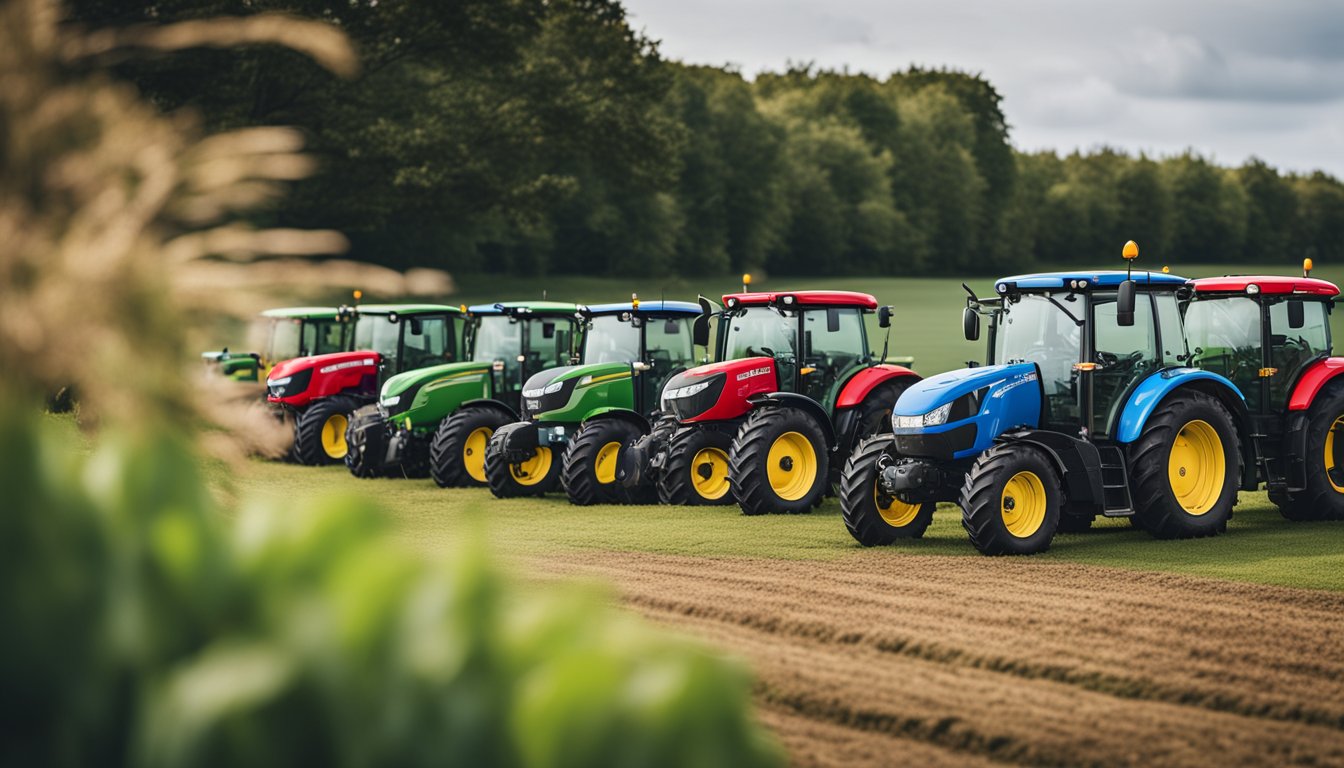Late updated: 17 Aug 2024 11:08
Written by: Oliver Bennett
Best Fuel Efficient Tractors For UK Farms: Top Picks for Sustainable Agriculture
For UK farmers, selecting the most fuel-efficient tractors can significantly impact both operational costs and environmental footprint. The search for the perfect tractor model involves evaluating performance, operational efficiency, and compliance with the latest emissions standards. In this blog post, we highlight the top fuel-efficient tractors available in the UK market, helping you make an informed decision for your farming needs.

Fuel efficiency isn't just about saving on costs—it's about optimising performance while adhering to environmental regulations. Models equipped with Tier 4i emissions-compliant engines, like the Case IH Magnum 340 and John Deere 8335R, are noteworthy for their excellent fuel consumption metrics. Our exploration includes data from independent tests, such as the renowned Nebraska Tractor Test Lab, ensuring that you get insights based on reliable performance evaluations.
As we examine the leading models, you’ll find that tractors like the Fendt 728 Vario stand out for their impressive results in tests measuring performance and efficiency. By choosing the right tractor, you can ensure not only cost savings but also enhance the sustainability of your farming operations. Let’s dive into the best options that combine robust performance with fuel efficiency.
Key Takeaways
- We explore top fuel-efficient tractors for UK farms.
- Performance evaluations are backed by reliable tests.
- The right tractor can optimise costs and sustainability.
Evaluating Tractor Performance and Fuel Efficiency
Evaluating tractor performance and fuel efficiency involves multiple aspects, including historical advancements, test results, and the influence of different transmission options. This section delves into how these elements contribute to efficient farm operations.
Historical Advances in Tractor Efficiency
Over the past decade, tractor technology has seen remarkable advancements, particularly in fuel efficiency. The introduction of Tier 4 interim engines and Tier 4i emissions-compliant engines has played a significant role in reducing fuel consumption and emissions.
For instance, models like the Case IH Magnum 340 and John Deere 8335R, which feature Tier 4i engines, stand out. These tractors not only meet stringent emissions standards but also demonstrate improved fuel efficiency. These advances ensure that modern tractors deliver high performance while being environmentally conscious.
Understanding PTO Test Results and Torque
Power take-off (PTO) test results are critical in evaluating tractor performance. These tests measure the power available from the tractor to operate PTO-driven implements.
One key metric is torque, which reflects the rotational force the tractor's engine produces. Torque rise, the increase in torque as engine speed decreases, is particularly relevant. A higher torque rise indicates better performance under heavy loads. Accurate interpretation of these results helps us understand a tractor's fuel efficiency and operational capabilities in various farming tasks.
Key Findings from the Nebraska Tractor Test Lab
The Nebraska Tractor Test Lab has been a pivotal institution in assessing tractor performance over the past 10 years. Their comprehensive tests cover fuel use, horsepower, and operational efficiency.
Their findings highlight the top 40 most fuel-efficient tractors, which include models fitted with modern Tier 4i engines. For instance, the John Deere 8360R IVT was acknowledged for its efficient fuel use despite its high horsepower. These test results provide us with reliable data to make informed decisions regarding tractor purchases and upgrades.
The Influence of Transmission Options on Efficiency
Transmission types significantly influence a tractor's fuel efficiency. Advanced transmission systems such as Variable Transmission Options (VT), including IVT, play a crucial role.
The Fendt 728 Vario, equipped with a sophisticated VT system, showcases how such technology can enhance fuel efficiency. Independent tests have confirmed its economic fuel consumption compared to other models in its power range. Choosing the right transmission can thus lead to cost savings and reduced environmental impact.
In summary, evaluating tractor performance and fuel efficiency is multifaceted, incorporating historical advancements, PTO tests, transmission options, and comprehensive test results. Each element offers unique insights, guiding us towards optimising farm operations with both productivity and sustainability in mind.
Top Fuel-Efficient Tractor Models in the UK Market

We will explore some of the top fuel-efficient tractor models available in the UK. This includes well-known brands such as John Deere, Case IH, Kubota, Massey Ferguson, New Holland, and Valtra.
John Deere's S Series and 6R Series for Optimal Efficiency
John Deere's S Series and 6R Series are renowned for their fuel efficiency. The S Series features advanced engine technology and a high-efficiency cleaning system. Fuel-saving features like the HarvestSmart™ system adjust the harvesting speed for optimal engine load.
The Robust Performance of Case IH Magnum 340
The Case IH Magnum 340 is equipped with a Tier 4 interim emissions-compliant engine. This model is designed to deliver powerful performance while minimising fuel consumption. Features such as CVT transmission and front axle suspension optimise fuel efficiency and ride comfort.
Kubota's Approach to Fuel Efficiency in Tractors
Kubota focuses on compact and efficient designs. The M7001 Series is an excellent example, featuring powerful engines and advanced fuel management systems. Its Kubota Variable Transmission allows smooth, efficient power delivery, making it ideal for a range of agricultural tasks.
Massey Ferguson and the Quest for Advanced Fuel Efficiency
Massey Ferguson's MF 8700 S Series stands out in fuel efficiency. These tractors use AGCO Power engines with e3 SCR technology to reduce fuel consumption and meet stringent emissions standards. The Dyna-VT transmission ensures efficient power usage and versatility across various applications.
New Holland's Commitment to Greener Agriculture
New Holland offers fuel-efficient models like the T7 Heavy Duty and T8 Genesis™ series. These tractors feature ECOBlue™ Hi-eSCR technology, which optimises fuel efficiency and reduces emissions. Advanced hydraulics and transmission options enhance performance and handling.
Valtra's Innovations in the T Series Lineup
Valtra has made significant strides in fuel efficiency with its T Series. Equipped with AGCO Power engines and smart farming technologies, Valtra tractors are designed for optimal fuel use. The T254 Versu model includes a CVT transmission, which enhances fuel economy and operational efficiency.
Frequently Asked Questions

We've compiled answers to some of the most common questions about fuel-efficient tractors for UK farms. Understanding these factors can help make informed decisions on which tractors best suit your farming needs.
What are the top-performing tractors in terms of fuel economy for UK farmers?
The top-performing tractors often include models from John Deere, Case IH, and New Holland. These brands have consistently shown excellent fuel efficiency in various tests and real-world applications. Specific models like the John Deere 8335R are well-regarded for their fuel-saving capabilities.
How does the fuel efficiency of John Deere tractors compare within the UK market?
John Deere tractors are known for their competitive fuel efficiency. Models such as the John Deere 8335R and 8360R have performed well in fuel efficiency tests. These tractors feature advanced engine technologies that optimise fuel usage without sacrificing performance.
Can you list the most cost-effective tractors when considering fuel efficiency?
Cost-effective tractors with a focus on fuel efficiency include models like the Ford 70HP and certain John Deere and Case IH models. These tractors provide a balanced approach of cost and fuel savings, making them ideal choices for budget-conscious UK farmers.
What advancements have been made in tractor technology to improve fuel efficiency?
Recent advancements include the introduction of Tier 4i emissions-compliant engines and improved fuel injection systems. These technologies reduce fuel consumption and enhance overall efficiency. Manufacturers have also introduced automatic gear-changing mechanisms and better aerodynamics to further improve fuel efficiency.
Which compact tractors offer the best fuel efficiency for small-scale UK farming?
For small-scale farming, compact tractors such as the Kubota L Series and John Deere 2 Series are known for their excellent fuel efficiency. These models are designed to handle a variety of tasks while minimising fuel consumption, making them ideal for smaller plots.
How does weather and terrain affect the fuel efficiency of tractors in the UK agricultural sector?
Weather and terrain significantly impact fuel efficiency. Wet or muddy conditions can increase fuel usage as tractors work harder to maintain traction. Similarly, hilly or uneven terrain requires more energy, leading to higher fuel consumption. It’s essential to consider these factors when evaluating tractor efficiency for specific farming environments.
